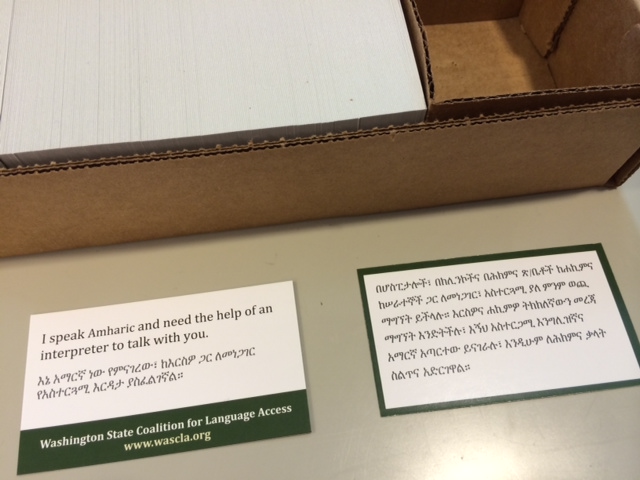Oct
12

Posted by Patricia Devine on October 12th, 2015
Posted in: News from Network Members
Editor’s note: This outreach project report was completed and submitted in 2014, but the information is still very relevant:
By Joana Ramos, jramos@wascla.org
Washington State Coalition for Language Access
 The Washington State Coalition for Language Access marked an important milestone on April 24, 2014, with the launch of its Tools for Health project at a special event held at Harborview Medical Center in Seattle. This project created the first centralized resource in the state for multilingual consumer materials about language access rights in healthcare. The launch date itself had special significance as it coincided with the 50th anniversary week of the signing of the Civil Rights Act, on April 21, 1964. The Act’s Title VI includes a ban on discrimination based on national origin which is the legal basis for guaranteeing equal access to services for people with limited English proficiency (LEP).
The Washington State Coalition for Language Access marked an important milestone on April 24, 2014, with the launch of its Tools for Health project at a special event held at Harborview Medical Center in Seattle. This project created the first centralized resource in the state for multilingual consumer materials about language access rights in healthcare. The launch date itself had special significance as it coincided with the 50th anniversary week of the signing of the Civil Rights Act, on April 21, 1964. The Act’s Title VI includes a ban on discrimination based on national origin which is the legal basis for guaranteeing equal access to services for people with limited English proficiency (LEP).
The idea for the Tools for Health project itself came from ongoing observations by WASCLA members of the need for increased awareness of the right to meaningful language assistance, among both the general public and healthcare providers. While some facilities in Washington now do an excellent job in providing language access services, the situation varies tremendously across the state. It is still common to hear of patients being turned away due to lack of interpreter services, or being told to bring a friend or relative or even their child, to interpret at medical appointments. The need for language assistance is greater than ever, as Washington’s changing demographics mean that LEP residents are now 8% of the population, or over 512,000 people. Our LEP population, about half of whom are Spanish-speakers, increased 210% between 1990- 2010, compared to an 80% increase nationally for this period. Courts, schools, social service programs and medical providers report providing interpreter services in up to 200 different languages. This project was also timely because of the start of implementation of the Affordable Care Act in 2013, with our state-based marketplace Washington Healthplanfinder set to open for business in the fall. Immigrants and refugees, many of whom have low incomes as well as LEP, have had some of the highest rates of uninsurance, often due to lack of employer coverage or eligibility for government programs.
We knew that building awareness is a logical first step to addressing this problem, and determined that a practical approach would be best. The technique we envisioned was not new: the creation of bilingual “I Speak” cards (each written in English and a specific target language) and single-language consumer information flyers which explain language access rights and their importance, how to request services, and which agencies to contact in the case of access problems. The approach WASCLA took was new in that we sought to translate materials into 30 plus language and create an online resource to act as a clearinghouse of resources. Through this project, we created Washington’s first-ever virtual public information clearinghouse to offer these materials at no cost , along with other resources for reliable multilingual health and healthcare information. WASCLA has been a member of the National Network of Libraries of Medicine/Pacific Northwest Region for several years, so we were aware of NLM’s funding opportunities and determined that our project would be a good fit to apply for a Health information Services award.
We were delighted to have our request approved and quickly assembled a small team of volunteers for the multi-layered project, which included:
• crafting the precise messages to convey at a 4th-5th grade reading level for health literacy needs;
• selecting the scope of languages to include, not an easy task, as there is no single language data source;
• developing a strong translation protocol and applying it to all the many steps necessary to achieve high-quality translations;
• preparing materials for publication, then printing, and dissemination.
The Tools for Health “I Speak” cards were translated into Washington’s 31 most-commonly spoken languages , and the information flyers into the 30 corresponding written languages. The differential count reflects the need for cards identifying the spoken languages Cantonese and Mandarin to be readable in both Simplified and Traditional Chinese texts. Through this project, WASCLA printed 180,000 “I Speak” cards which will be distributed for free throughout Washington State. We have worked with community organizations serving LEP populations to get these resources into the programs that are serving the target populations
For the web-based component of the project, all of the materials, plus instructions on how to request print versions while supplies last, and background information, are posted for free download on the WASCLA website at: http://www.wascla.org/library/folder.515983-WASCLA_Tools_for_Health